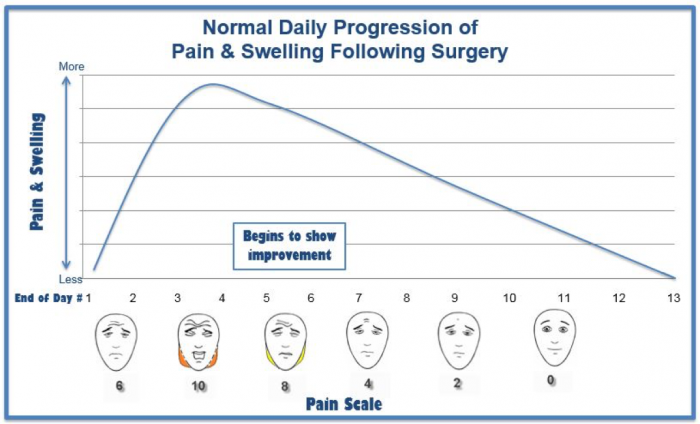
1. Immediate Post-Operative Instructions
- Go directly home from the office. Attempt to eat soft food and take your pain medications as soon as possible. Taking pain-meds on an empty stomach will cause nausea. Consuming plenty of fluids and nutrition today is important and minimizes the risk of nausea/vomiting.
- Day of surgery only, apply ice packs to the area(s) of surgery to reduce future swelling and pain (focus on the lower jaw if you had your bottom wisdom teeth removed). Ice packs should be applied 15 minutes on and 15 minutes off for the first 24 hrs.
- Bite down firmly on the gauze packs that have been placed over the surgical areas, making sure they remain in place for around 20-30 minutes.
2. Diet
- Utilize a soft diet only for two weeks (tomato soup, yogurt, mashed potatoes, scrambled eggs, well steamed vegetables, well cooked pasta, and pudding). It is best to avoid foods with small seeds which can get lodged in the extraction area.
- Avoid the use of straws for 2 weeks as the suction can pull bacteria into the extraction site and cause an infection or dry socket.
- Your food intake will be limited for the first few days. You should compensate for this by increasing your fluid intake. At least 5-6 glasses of liquid should be taken daily. Try not to miss a single meal. You will feel better, have more strength, less discomfort and heal faster if you continue to eat.
3. Medications
- Take pain medications as directed. Pain will peak around day 3 after surgery.
- If given a prescription mouth-wash, gently swish only 2-3 times daily. Do not rinse mouth after swishing.
- If prescribed, take all antibiotics until gone.
4. Activity
- Do not drive or operate machinery for 24 hours. Do not engage in sports, aerobics, heavy work, or heavy lifting for seven days. Avoid the use of tobacco products and alcohol for at least seven days.
5. Surgical Site Care
- Resume brushing your teeth, as best as possible, starting the night of the surgery to reduce the risk of an infection.
- After meals, rinse your mouth very gently during the first 24 hours. Do not spit forcefully. Aggressive rinsing may dislodge blood clots and interrupt the normal healing process. Following the first day, rinsing after meals can be slightly more vigorous and it is generally a good idea to rinse with a warm diluted salt solution (1/4 teaspoon salt in 8 oz. water). Avoid the use of commercial mouthwashes, as they may contain alcohol, which can delay initial healing.
- When you depart the dental office, you will be biting on gauze. Bite on the gauze packing over the surgical site(s) for at least 20-30 minutes. Apply constant firm pressure, do not chew. It is common to have to replace gauze every 20-30 minutes for the first day. If bleeding persists, place new gauze on the extraction site(s) and continue applying constant biting pressure. It is better to continually bite on the gauze than to keep changing it every few minutes. If the surgical site(s) are still bleeding after 1 hour, you may substitute a tea bag (soaked in hot water, squeezed damp-dry) for 20 or 30 minutes. Slight bleeding or oozing may occur following extractions and is expected for the first 24 hrs. Red tinged saliva is normal for a few days following surgery and is not indicative of bleeding. If excessive uncontrolled bleeding occurs, consult your surgeon.
- Normal swelling will reach a peak on the second to third day after surgery. This is also when discomfort tends to peak. It is normal to have bruising in the area of the surgery. After day three, the remainder of the post-operative course should be a gradual but steady improvement.
- Two days after surgery, you may apply warm compresses (ex: a microwaved damp wash cloth) on the side of the face to aid in healing.

6. The Most Common Questions Answered
- What if I am nauseous? Nausea is common after surgery. Nausea can be reduced by preceding each pain pill with soft food and large amount of water. Classic Coca Cola or ginger ale may help if nausea has occurred.
- Do I need to get my sutures removed? Any sutures that were placed will dissolve on their own, anywhere from 3-10 days after surgery.
- What do I do with my plastic irrigating syringe? If you are given a plastic irrigating syringe, DO NOT use it until post-op day 4-5. Then use it daily until you are certain the tooth socket has closed completely and that there is no chance of any food particles lodging in the socket (usually 2-3 weeks).
- My friend said their surgery was different, what should I do? Your case is individual, as no two mouths are alike. Do not accept well intended advice from friends. Discuss your problem with the persons best able to effectively help you, which are your surgeon and family dentist.
- What if I need to contact my surgeon? Dr. Bazilus is always available for any questions or concerns you might have following your surgery. Please do not hesistate to contact Dr. Bazilus if you have any additional questions. The doctors cell phone is also listed on the printable post-op form on the link below.
YOUR IV SEDATION DENTIST | Dr. Kurt Bazilus



